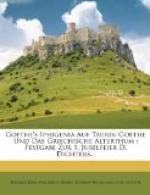Iphigenia.
For mine own sake I ne’er desired it from thee.
Who to the gods ascribe a thirst for blood
Do misconceive their nature, and impute
To them their own inhuman dark desires.
Did not Diana snatch me from the priest,
Preferring my poor service to my death?
Thoas.
’Tis not for us, on reason’s shifting grounds,
Lightly to guide and construe rites divine.
Perform thy duty; I’ll accomplish mine.
Two strangers, whom in caverns of the shore
We found conceal’d, and whose arrival here
Bodes to my realm no good, are in my power.
With them thy goddess may once more resume
Her ancient, pious, long-suspended rites!
I send them here,—thy duty not unknown. [Exit.
Iphigenia,
alone.
Gracious
protectress! thou hast clouds
To
shelter innocence distress’d,
And
genial gales from Fate’s rude grasp,
Safely
to waft her o’er the sea,
O’er
the wide earth’s remotest realms,
Where’er
it seemeth good to thee.
Wise
art thou,—thine all-seeing eye
The
future and the past surveys,
And
doth on all thy children rest,
E’en
as thy pure and guardian light
Keeps
o’er the earth its silent watch,
The
beauty and the life of night.
O
Goddess! keep my hands from blood!
Blessing
it never brings, nor peace;
And
still in evil hours the form
Of
the chance-murder’d man appears
To
fill the unwilling murderer’s soul
With
horrible and gloomy fears.
For
fondly the Immortals view
Man’s
widely-scatter’d, simple race;
And
the poor mortal’s transient life
Gladly
prolong, that he may raise
Awhile
to their eternal heavens
His
sympathetic joyous gaze.
Actthe second.
SceneI.
Orestes. Pylades.
Orestes.
It is the path of death that now we tread:
At every step my soul grows more serene.
When I implor’d Apollo to remove
The grisly band of Furies from my side,
He seem’d, with hope-inspiring, godlike words,
To promise aid and safety in the fane
Of his lov’d sister, who o’er Tauris rules.
Thus the prophetic word fulfils itself,
That with my life shall terminate my woe.
How easy ’tis for me, whose heart is crush’d,
Whose sense is deaden’d by a hand divine,
Thus to renounce the beauteous light of day!
And must the son of Atreus not entwine
The wreath of conquest round his dying brow—
Must I, as my forefathers, as my sire,
Bleed like a victim,—an ignoble death—
So be it! Better at the altar here,




